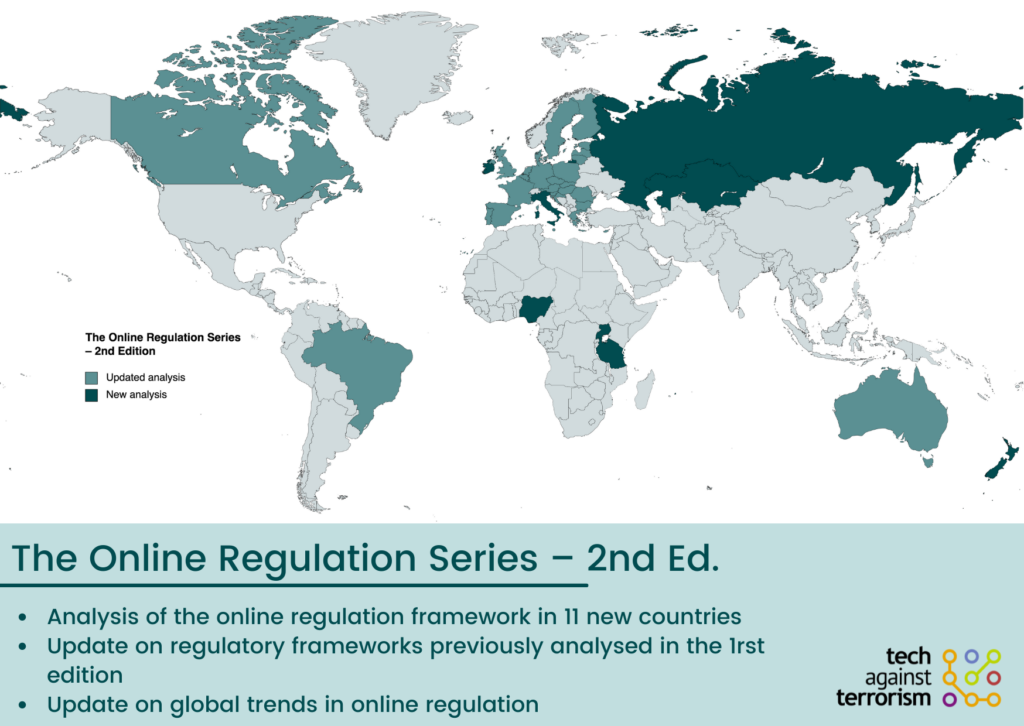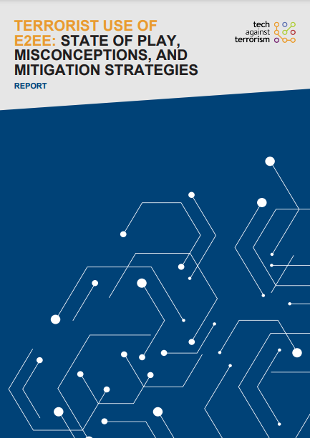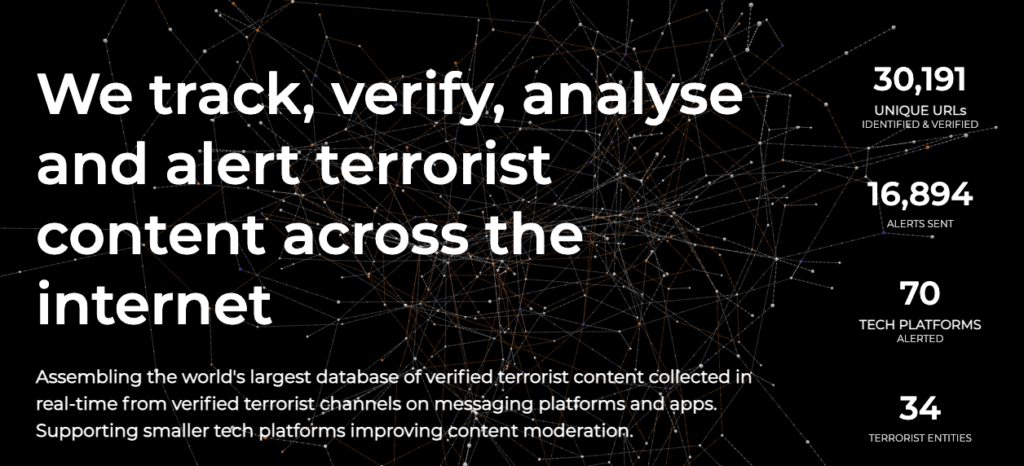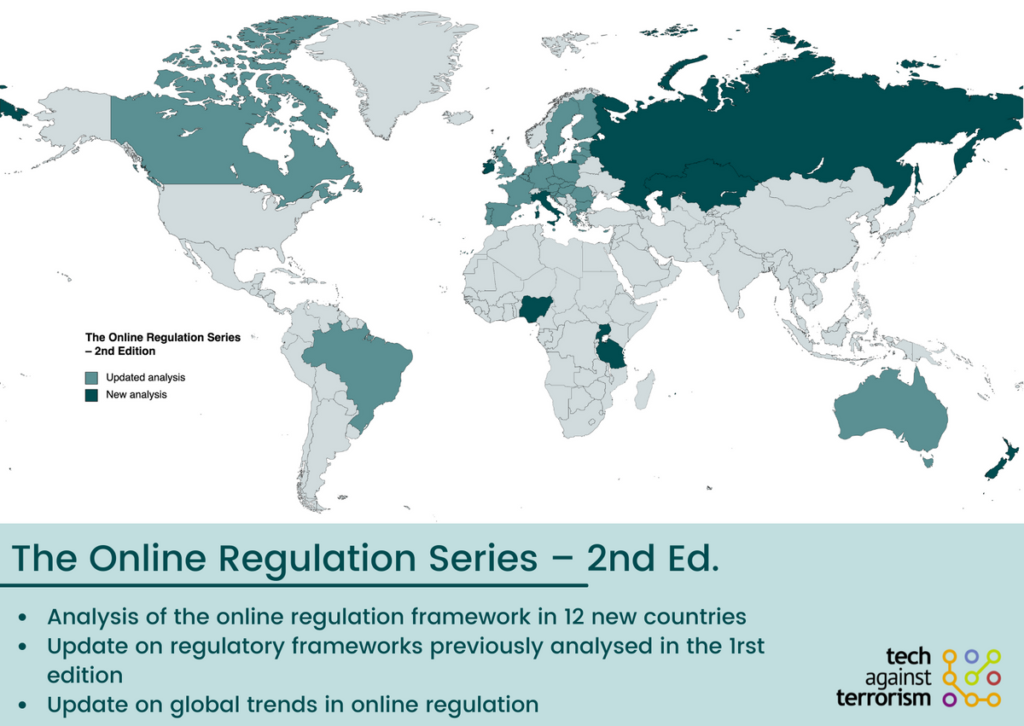Reader's Digest – 14 January 2022
Our weekly review of articles on terrorist and violent extremist use of the internet, counterterrorism, digital rights, and tech policy.
Tech Against Terrorism Updates
- We are excited to announce that we are launching the new Terrorist Content Analytics Platform (TCAP) website this month. The new site will have updated graphics, a more user-friendly interface explaining in detail how the TCAP works and our policies, as well as a timeline of our main achievements.
- Thank you for following our 2nd edition of the Online Regulation Series, in which we provided tech companies with an updated analysis of the fast-evolving global online regulatory landscape. This week, we published a blog post summarising the ORS 2.0, and linking to all the blog posts published during this 2nd edition of our landmark project on global online regulation.

Tech Against Terrorism Spotlight
- Revisiting the important topic of terrorist use of end-to-end encryption (E2EE), we highlight our landmark report providing an in-depth examination of the risks related to terrorist and violent extremist abuse of E2EE services, outlining mitigation strategies for tech platforms, as well as recommendations for policymakers and law enforcement on how to counter this threat whilst safeguarding the right to privacy online.
You can access the report here, and the executive summary of our findings, including our high-level recommendations, here.

Top Stories
- Nigeria has lifted the ban on Twitter after the company agreed to the government’s requirements, including by opening a local office, appointing a country head, and paying domestic taxes.
- Ireland has passed the Online Safety and Media Regulation Bill, outlining new online safety standards for social media companies and broadcasting services. The Bill is the country’s first piece of legislation to deal with harmful and illegal content online. Tech platforms failing to remove criminal material could face fines for failing to comply.
As part of the Online Regulation Series 2.0, Tech Against Terrorism has recently published an analysis of the Online Safety and Media Regulation Bill. You can access the blog post here and on the website of our Vox-Pol partners.
- Verizon has joined the Global Network Initiative, an NGO dedicated to preventing internet censorship and protecting internet privacy rights, as its first US-based telecommunications company.
- Authorities in Sweden and France have launched a joint task force to prosecute ISIS fighters for their persecution of the Yazidi population. The aim of the team is to identify foreign terrorist fighters who were involved in international crimes against members of the Yazidi minority in Syria and Iraq.
- The United States Department of Defence Office of Inspector General will audit how the military screens applicants for extremist and supremacist behaviour. This comes alongside a new set of rules announced last month to combat extremism in the military.
- Following a rally by French far-right presidential candidate Eric Zemmour, France has banned an extremist right-wing youth group called Zouaves Paris for inciting violence. The group is described as an ultranationalist group and is known for violent agitation, overtly racist ideology, and the use of Nazi and Ku Klux Klan symbols. Its leader is involved in the French neo-Nazi milieu and has ties with the Azov Battalion in Ukraine.
- A South African Court has charged a man suspected of starting a fire in the country’s parliament with terrorism, in addition to robbery and arson accusations.
- After violent protests in Kazakhstan against a sharp rise in petroleum prices, the former head of the country’s counterintelligence and counter-terror agency has been arrested on charges of attempted government overthrow. Kazakhstan’s President, Kassym-Jomart Tokayev, blames the protests – the most widespread since the country’s independence from the Soviet Union in 1991 – on foreign-backed terrorists.
- The United Arab Emirates envoy to the UN called for a more comprehensive approach to tackling armed extremists in Mali.
- The EU Data Protection Watchdog has ordered Europol to delete much of a vast store of personal data, which according to the European Data Protection Supervisor (EDPS) had been collected unlawfully. The EDPS found sensitive data drawn from crime reports, hacked from encrypted phone services and sampled from asylum seekers never involved in any crime.
- A report has been drafted by a consortium of French researchers on the spread of misinformation online. The report, commissioned by President Macron, outlines recommendations to counter the spread of misinformation, with a focus on increased research to understand its actual impact (online and offline), on digital literacy in schools, and on ensuring that the countering of misinformation is included in the upcoming EU Digital Services Act.
You can find our ORS blogpost on the EU's online regulatory framework here.
Tech Policy & Counterterrorism
- Slain officer’s sister sues Facebook in ‘boogaloo’ murder, alleging it pushed extremist content: The sister of a US federal officer killed during racial justice protests in 2020 is suing Facebook’s parent company Meta, alleging it is responsible for facilitating the hateful far-right Boogaloo movement, knowingly promoting extremist content, and connecting individuals who “planned to engage in acts of violence against federal law enforcement officers.” The suit alleges wrongful death and a survival action for the pain and suffering the officer endured before he died, citing negligent design by Facebook. The Social Media Platform has pushed back against the allegations, stating the claims have no legal basis and emphasising their banning of over 1000 militarised social movements and the taking down of hundreds of groups and accounts connected to the Boogaloo movement. The author underlines that Facebook is protected against such lawsuits by Section 230 of the Communications Decency Act, which states that platforms are not publishers of content posted on their sites and therefore cannot be held liable for it, though a series of bills seek to erode this law. (Siddiqui, The Washington Post, 06.01.2022).
You can find our review of the US online regulatory framework here, and an article summarising proposed reforms to Section 230 here.
- Justice Department Forms Domestic Terrorism Unit: The US Justice Department is creating a unit dedicated to fighting domestic terrorism. The department’s national security division has a counterterrorism team, but a new team of lawyers will be dedicated to the domestic threat and ensure that cases are coordinated effectively across the agency and federal law enforcement. This aligns with Attorney General Merrick B. Garland’s stated efforts to prioritise combatting domestic extremism. The creation of the unit comes as the Justice Department is investigating the January 6 storming of the US Capitol and is intended to augment existing approaches by counterterrorism attorneys who work on domestic and international terrorism cases. (Benner, The New York Times, 11.01.2022).
For any questions, please get in touch via:
contact@techagainstterrorism.org
- News (240)
- Counterterrorism (54)
- Analysis (52)
- Terrorism (39)
- Online Regulation (38)
- Violent Extremist (36)
- Regulation (33)
- Tech Responses (33)
- Europe (31)
- Government Regulation (27)
- Academia (25)
- GIFCT (22)
- UK (22)
- Press Release (21)
- Reports (21)
- US (20)
- USA (19)
- Guides (17)
- Law (16)
- UN (15)
- Asia (11)
- ISIS (11)
- Workshop (11)
- Presentation (10)
- MENA (9)
- Fintech (6)
- Threat Intelligence (5)
- Webinar (5)
- Propaganda (3)
- Region (3)
- Submissions (3)
- Generative AI (1)
- Op-ed (1)

